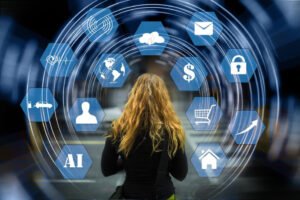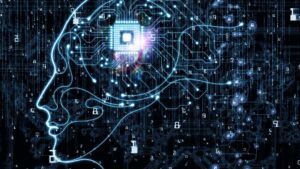9 Powerful Examples of Artificial Intelligence in Use Today include virtual assistants like Siri and Alexa, personalized content recommendations on streaming platforms, fraud detection systems in banking, navigation apps with real-time traffic data suggestions, self-driving cars, facial detection and recognition, text editors with autocorrect, search and recommendation algorithms, and chatbots. These examples demonstrate how AI is being integrated into various aspects of our everyday lives, from daily tasks and convenience to security and efficiency.
As AI continues to advance, its potential applications are only limited by our imagination. It has the power to revolutionize industries, enhance decision-making processes, and improve the overall quality of life for individuals around the world.
Examples Of Ai In Everyday Life
Virtual assistants like Siri and Alexa, personalized content recommendations on streaming platforms, fraud detection systems in banking, and navigation apps that suggest the best routes based on real-time traffic data are just a few powerful examples of artificial intelligence in everyday life.
Social Media
Social media platforms have been leveraging artificial intelligence to enhance user experience and provide personalized content. AI algorithms analyze user data, preferences, and interactions to curate tailored content feeds, recommendations, and targeted advertisements. This enables social media platforms to deliver relevant content that matches individual interests, increasing engagement and user satisfaction.
Virtual Assistants
Virtual assistants, such as Siri and Alexa, have become an integral part of our daily lives. Powered by artificial intelligence, these digital companions can perform various tasks, such as answering questions, setting reminders, playing music, and controlling smart home devices. They use natural language processing and machine learning algorithms to understand and respond to user commands, making interactions more intuitive and efficient.
Industrial Robots
Artificial intelligence has revolutionized the manufacturing industry through the integration of industrial robots. These advanced machines can automate repetitive and complex tasks, leading to increased productivity, precision, and efficiency. With AI capabilities, industrial robots can adapt to different situations, learn from experience, and make autonomous decisions, making them valuable assets in industries such as automotive, electronics, and logistics.
Chatbots
Chatbots are AI-powered virtual assistants that can engage in conversations with users, providing information and assistance in real-time. They are commonly used in customer service, where they can handle frequently asked questions, troubleshoot issues, and guide customers through various processes. Utilizing natural language processing and machine learning, chatbots continuously improve their responses and understand user intents, delivering a seamless and efficient support experience.
Types Of Ai
Artificial intelligence (AI) is widely used today in various fields, such as social media, virtual assistants like Siri and Alexa, fraud detection systems in banking, and navigation apps that provide real-time traffic data for the best routes. AI has also improved facial recognition, text editors, search algorithms, chatbots, digital assistants, and e-payment systems.
Natural Language Processing
Natural Language Processing (NLP) is a branch of artificial intelligence that focuses on enabling computers to understand and interpret human language. It involves the development of algorithms and models that process, analyze, and generate natural language data. NLP technology is used in various applications such as voice assistants, chatbots, language translation, sentiment analysis, and text summarization. By leveraging NLP, businesses can enhance customer service, automate tasks, and gain valuable insights from vast amounts of text-based data.Artificial General Intelligence
Artificial General Intelligence (AGI) refers to the ability of a machine to perform any intellectual task that a human being can do. AGI aims to replicate human-level intelligence, allowing machines to understand, learn, and apply knowledge across different domains. While AGI is the ultimate goal of artificial intelligence research, it remains a complex and challenging field. The development of AGI could have significant implications in various sectors, including healthcare, robotics, and advanced problem-solving.Deep Learning
Deep learning is a subset of machine learning that involves the use of artificial neural networks with multiple layers. These networks are designed to simulate the human brain’s structure and functioning, enabling machines to analyze and learn from vast amounts of data. Deep learning algorithms excel in tasks such as image recognition, speech recognition, and natural language processing. The application of deep learning has revolutionized many industries, including healthcare, finance, and autonomous vehicles.Theory Of Mind
Theory of Mind (ToM) refers to the ability of an intelligent system to understand and attribute mental states to oneself and others. It involves perceiving emotions, intentions, beliefs, and desires, which enables machines to interact and communicate effectively with humans. Developing ToM in artificial intelligence opens up new possibilities for social robots, virtual assistants, and communication systems. By understanding human emotions and intentions, machines can provide more personalized and empathetic interactions.Expert Systems
Expert systems are AI-based computer programs that emulate the knowledge and reasoning of human experts in specific domains. These systems use a set of rules and algorithms to analyze data, generate recommendations, and solve complex problems. Expert systems are widely used in various fields, including medicine, finance, and engineering. They can assist professionals in making informed decisions, diagnosing diseases, optimizing processes, and enhancing efficiency.Artificial Neural Network
An artificial neural network (ANN) is a computational model inspired by the structure and functioning of biological neural networks. ANNs consist of interconnected artificial neurons that process and transmit information. These networks can learn from examples, adapt to changing conditions, and make predictions based on input data. ANNs have revolutionized machine learning and are used in various applications, including image recognition, speech recognition, and pattern recognition. Overall, these various types of AI technologies have paved the way for significant advancements in various industries. From natural language processing to expert systems, the potential of artificial intelligence continues to grow, unlocking new opportunities and transforming the way we live and work.Ai Software Examples
AI software examples include IBM Watson, Google Assistant, TensorFlow, Microsoft Azure, Salesforce Inc. , and Amazon Alexa. These powerful tools are widely used in everyday life for tasks such as virtual assistants, personalized content recommendations, fraud detection systems, and navigation apps.
IBM Watson IBM Watson is one of the most well-known AI platforms in the world. It offers a wide range of AI and cognitive computing services, including natural language understanding, sentiment analysis, and machine learning. Watson is used by various industries, from healthcare to finance, to analyze large amounts of data and make informed decisions. With its advanced capabilities, IBM Watson is revolutionizing how businesses operate and providing innovative solutions to complex problems. Google Assistant As one of the most popular virtual assistants, Google Assistant utilizes AI to provide personalized experiences and assist users with various tasks. From answering questions to setting reminders, Google Assistant uses natural language processing and deep learning algorithms to understand user intent and deliver relevant information. It can also interact with other smart devices, making it an integral part of the smart home ecosystem. TensorFlow TensorFlow is an open-source machine learning framework developed by Google. It has gained immense popularity due to its powerful capabilities and ease of use. With TensorFlow, developers can train and deploy machine learning models for various applications, such as image and speech recognition, natural language processing, and recommendation systems. Its flexibility and scalability make it a preferred choice for both research and industry. Microsoft Azure Microsoft Azure is a cloud computing platform that offers a wide range of AI services. By leveraging Azure, businesses can integrate AI capabilities into their applications without the need for extensive infrastructure investments. Azure provides services like cognitive services, machine learning, and chatbots to empower organizations with intelligent applications. Its scalability, security, and extensive toolset make it a popular choice among enterprises. Salesforce Inc Salesforce Inc, a leading CRM provider, incorporates AI into its platform to help businesses improve their customer service and sales processes. With Salesforce Einstein, users can harness the power of AI to automate repetitive tasks, analyze data, and provide personalized recommendations. Salesforce’s AI capabilities enable businesses to gain valuable insights from their customer data, enhance productivity, and drive revenue growth. Amazon Alexa Amazon Alexa, a voice-controlled virtual assistant, has become a household name. Powered by AI, Alexa can perform various tasks, such as playing music, controlling smart home devices, and providing information on the go. With its voice recognition and natural language understanding capabilities, Alexa allows users to interact with their devices in a more intuitive and convenient way. Its widespread adoption and integration with numerous third-party services make it an indispensable part of our daily lives. These AI software examples showcase the diverse applications and potential of artificial intelligence in our modern world. From cognitive computing to virtual assistants, these technologies are transforming industries and enhancing our daily experiences. Whether it’s analyzing data, understanding human language, or delivering personalized recommendations, AI software continues to push boundaries and shape our future.Usage Of Ai In Everyday Life
Examples of artificial intelligence in everyday life include virtual assistants like Siri and Alexa, personalized content recommendations on streaming platforms, fraud detection systems in banking, and navigation apps that suggest the best routes based on real-time traffic data.
Virtual Assistants
Virtual assistants like Siri and Alexa have become an integral part of our everyday lives. Whether it’s setting reminders, answering questions, or controlling smart home devices, these AI-powered assistants are always ready to lend a helping hand. The advancements in natural language processing and machine learning algorithms have made virtual assistants more intuitive and capable of understanding human speech and delivering personalized responses. They continue to evolve and improve, becoming smarter and more efficient with each passing day.Personalized Content Recommendations
Streaming platforms such as Netflix and Spotify utilize AI algorithms to provide personalized content recommendations to their users. By analyzing user preferences, viewing history, and behavior patterns, these algorithms suggest movies, TV shows, songs, and playlists that are most likely to be of interest to the individual. This not only enhances the user experience but also increases user engagement and customer satisfaction.Fraud Detection Systems
Banks and financial institutions rely on fraud detection systems powered by AI to detect and prevent fraudulent activities. These systems analyze vast amounts of data including transaction history, user behavior, and patterns to identify any suspicious or fraudulent activities. By constantly learning from previous incidents and adapting to new threats, these AI systems help minimize financial losses and protect customer accounts.Navigation Apps
Navigation apps like Google Maps and Waze make use of AI to suggest the best routes based on real-time traffic data. By analyzing historical traffic patterns, current road conditions, and user input, these apps are able to provide accurate and timely navigation instructions. They can also predict travel times, optimize routes, and offer alternative options in case of traffic congestion or accidents. This AI-powered assistance enables us to navigate through busy city streets and reach our destinations more efficiently. In our everyday lives, AI is continually being integrated into various technologies, enhancing functionality and improving user experiences. From virtual assistants to personalized content recommendations, fraud detection systems, and navigation apps, AI is transforming the way we interact with technology and shaping the future of everyday life.
Credit: pentoztechnology.wordpress.com
Frequently Asked Questions On 9 Powerful Examples Of Artificial Intelligence In Use Today
What Are The 4 Powerful Examples Of Artificial Intelligence In Use Today?
Examples of powerful artificial intelligence in use today include: Siri, personal digital assistants like Alexa, personalized content recommendations on streaming platforms, fraud detection systems in banking, and navigation apps with real-time traffic data.
What Is Strong Ai Examples?
Strong AI examples include self-driving cars, virtual assistants like Siri and Alexa, personalized content recommendations on streaming platforms, fraud detection systems in banking, and navigation apps that suggest the best routes based on real-time traffic data.
What Are Two Examples Of Ai In Our Day To Day Life?
Two examples of AI in our day-to-day life are virtual assistants like Siri and Alexa, and personalized content recommendations on streaming platforms.
What Is The Most Powerful Artificial Intelligence?
Google’s most powerful AI model, Gemini, is considered the most powerful artificial intelligence.
Conclusion
Artificial intelligence is revolutionizing our everyday lives in countless ways. From virtual assistants like Siri and Alexa to personalized content recommendations on streaming platforms, AI is enhancing our experiences. It’s also improving safety with fraud detection systems in banking and providing real-time traffic data for navigation apps.
As we continue to explore the possibilities of AI, we can expect even more innovative applications that will make our lives easier and more efficient. Embracing this technology opens up endless possibilities for the future.




